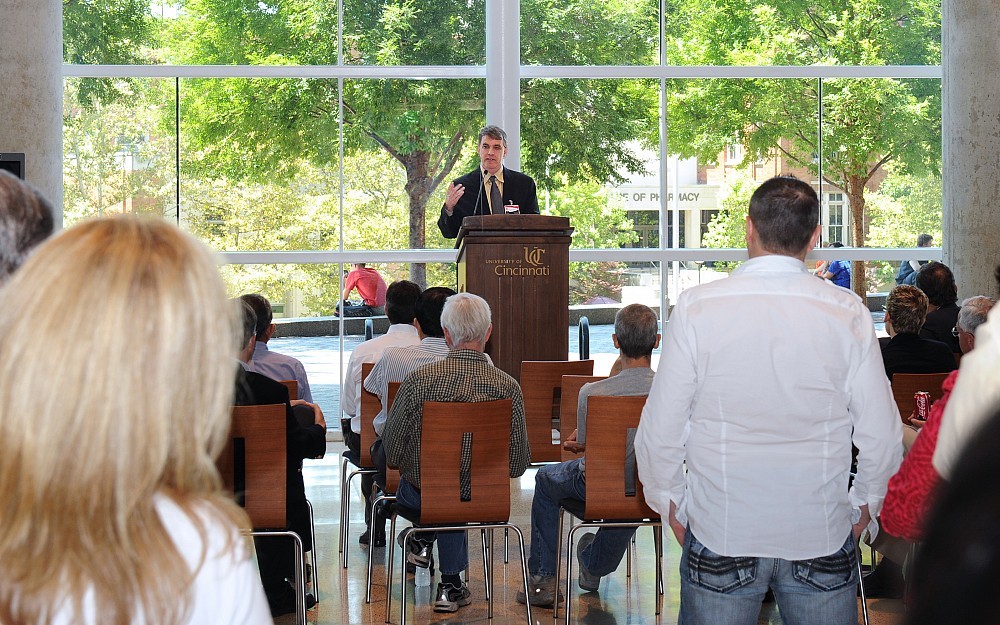
College of Medicine Launches Research Initiative
The UC College of Medicine this week launched the Discovery Acceleration Initiativea $1 million effort aimed at strengthening the colleges position with major funders of biomedical research.
Supported by the UC Senior Vice President for Academic Affairs and Provost Santa Ono, PhD, William Ball, MD, interim vice president for research, and Thomas Boat, MD, dean of the College of Medicine, the Discovery Acceleration Initiative is designed to help faculty investigators generate increased research funding from federal and industry sources.
This new initiative, through four unique programs, will support a wide range of faculty investigators: from junior investigators needing assistance with refining grant proposals and gathering preliminary data, to more established investigators needing access to core facilities and short-term funding to bridge the gap between grant application and grant award.
Stephen Strakowski, MD, senior associate dean for research at the College of Medicine, launched the initiative Monday, June 25, during an event with faculty.
Formed out of a series of discussions with UC researchers and members of the College of Medicine Research Cabinet, the initiative and its four programs, said Strakowski, are an "integral part of our larger research infrastructure, which includes key core facilities for conducting research and the Center for Clinical and Translational Science and Training, funded by an institutional Clinical and Translational Science Award from the National Institutes of Health (NIH).
"I believe that these new programs will help to accelerate research activity here and help position us to maintain our strong research programs and build excellence in emerging areas of interest, said Strakowski.
Following are details about the four programs of the Discovery Acceleration Initiative:
College of Medicine Study Section
Run in similar fashion to study sections at the National Institutes of Health, the College of Medicine Study Section is aimed at supporting the refinement of scientific projects and grantsmanship prior to official submission of a grant application to a funding agency, in order to improve grant-writing success for investigators.
The Study Section will be led by Marshall "Chip Montrose, PhD, professor and chair of the department of molecular and cellular physiology.
Study Section reviews will be conducted in three cycles to coincide with major NIH grant deadlines, although grant submissions to other agencies will also be accepted for review. As an added benefit, up to two meritorious applications reviewed in each cycle will receive a $10,000 award to support the investigators research program.
The program kicks off with a call for letters of intent that will be sent the first week of July.
Core Facilities Support Program
The Core Facilities Support Program is designed to support investigators need for data through the use of the colleges core facilities. The program will also help to strengthen core facilities by subsidizing their operations through increased use.
To be managed by the CCTST Just-In-Time Core Facility Program, the College of Medicine Core Facilities Support Program will provide awards of up to $7,500 for core facility use.
The program is expected to begin July 1.
Provosts Pilot Research Program
Led by Melanie Cushion, PhD, of the infectious diseases division, and with the support of the CCTST, this program will provide seed money necessary to fuel innovative projects at the college and help our investigators develop competitive new grant applications.
The Provosts Pilot Research Program will fund up to 10 projects yearly at up to $40,000 each.
A request for letters of intent will be issued the first week of July with invitations for applications to follow.
Deans Bridge Funding Program
The Deans Bridge Funding Program has provided support in the past to researchers as they make their way through the NIH granting process. Researchers with a solid history of NIH funding who are in the application or grant renewal process will continue to be eligible for this funding. The top priority will be to bridge investigators though the NIH review period when a well-scored application is likely to be funded.
Funding will also be available for investigators who have an unscored application pending, but a strong track record that supports a likelihood of success.
Robert Highsmith, PhD, will lead the Deans Bridge Funding Program, which will make available between $30,000 to $50,000 each for four to six qualified applicants each year. Awards will be made over two cycles.
In fiscal year 2011, the College of Medicine brought in $133.4 million in research funding. When combined with total funding brought in by faculty affiliated with Cincinnati Childrens Hospital Medical Center, that total comes to $292.7 million.
UC is designated as a "very high research activity university by the Carnegie Commission and is listed by the National Science Foundation as No. 25 among public institutions for federal research expenditures and 47th in overall federal research expenditures.
Get more details on the initiative, including deadlines and instructions, at http://med.uc.edu/Research/DiscoveryAccelerationInitiative.aspx.
Related Stories
Alabama.com: How a new self-test for HPV could be a game changer
April 19, 2024
The University of Cincinnati's Leeya Pinder was featured in an Alabama.com/Reckon article about how self-testing for HPV could make preventative care more accessible to those facing the most barriers.
WLWT: Tips to fight off bad allergy symptoms
April 18, 2024
The University of Cincinnati's Ahmad Sedaghat spoke with WLWT about how Cincinnati's geography tends to make allergy symptoms worse and tips to fight off those symptoms.
Medscape: Skin adverse events rare after immunotherapy to treat...
April 17, 2024
Medscape highlighted University of Cincinnati research published in JAMA Dermatology that found skin adverse events were rare following immunotherapy treatments for certain skin cancers.
